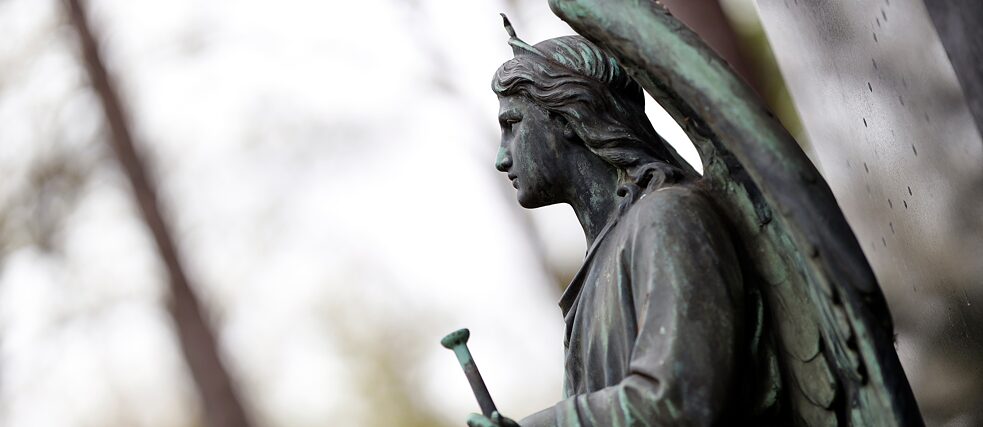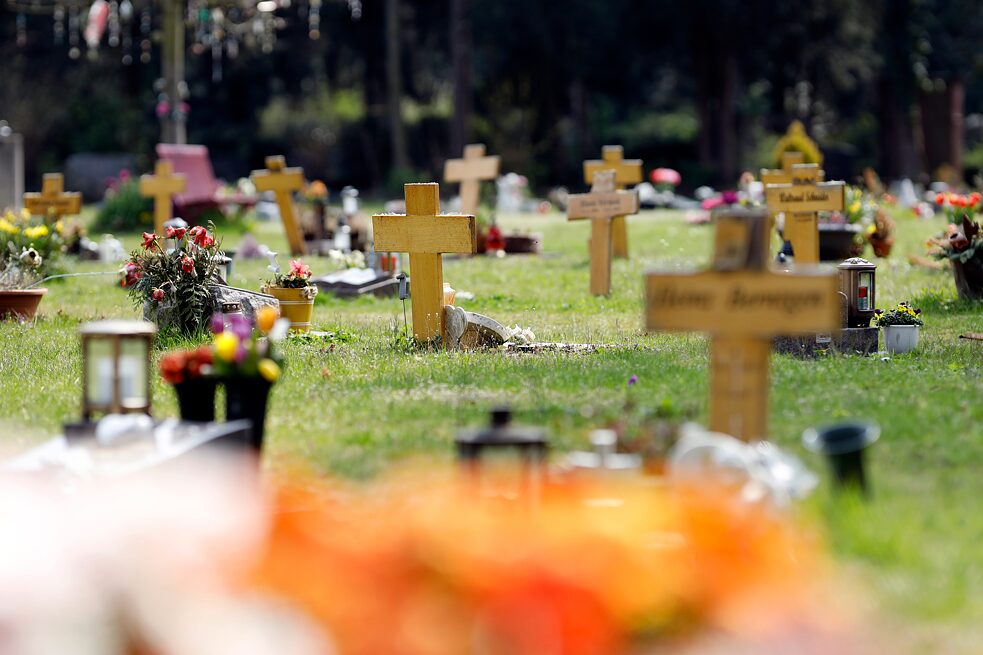Funerals during Corona in Germany
Stolen Time and No Goodbyes

The COVID-19 pandemic not only turned our lives upside down; it has also changed the way we deal with death. It often made it impossible for friends and family to say a final goodbye, and the sick have been forced to die alone, which has been painful for many relatives. The pandemic also changed the way those who accompany the dead and their relatives on their final journey work. In an interview Juliane Frankenheim, managing director of a long-established Düsseldorf funeral home, talks about the special challenges the coronavirus has created for the industry.
By Petra Schönhöfer
How has the coronavirus pandemic changed the way people deal with death?
Juliane Frankenheim: The pandemic really highlighted the issue of death since we were confronted with the number of deaths on a daily basis. This meant an essential aspect of our work, saying goodbye, became even more important. Before the pandemic, some of our clients wanted an open casket to see their loved ones for the last time. This number grew during the pandemic, when many family members were not given the chance to say a final goodbye in the hospital or care home.
How does saying goodbye to a loved one help??
Juliane Frankenheim: I think saying goodbye is important because our minds comprehend the concept of “forever” very quickly and also very early – children as young as seven to nine years old. We know exactly what it means when someone is dead in our minds at least. But the heart lags behind. The process of saying goodbye helps us truly understand what is happening. The coffin, the ultimate sign of death that can be understood without words, is right there. The body of the dead has grown cold and undergone changes. These are things that we have to see, things no one can explain with words. And people instinctively feel what this means for them. It takes them to another level where they understand that this is now the last path you can take with the deceased. And in the long run, it helps a lot to have walked this path together.
What has the pandemic changed for your everyday work?
Juliane Frankenheim: We have two departments that really work actively on deaths: The counselling department offers comfort and counsel to friends and relatives of the deceased, and the deceased disposal department works with and on the deceased. It takes care of picking up the body, builds the casket, prepares the remains. There have always been protective measures in place since we can never be one hundred percent sure what illness the deceased may have had, but we have increased them. We work with the highest safety standards, which means that masks have to be worn in addition to the usual protective clothing. That is not really relevant for those of us involved in counselling. It was more difficult to establish a close relationship to the relatives during the conversation with masks and a plexiglass wall between us. We almost had to shout, for example, so that some elderly people could understand us.
 By mid-August 2020, the coronavirus had caused just under 92,000 deaths in Germany. | Photo (detail): © picture alliance/Geisler-Fotopress/Christoph Hardt
By mid-August 2020, the coronavirus had caused just under 92,000 deaths in Germany. | Photo (detail): © picture alliance/Geisler-Fotopress/Christoph Hardt
Juliane Frankenheim: Everyone was quite panicked in the beginning. We were locked in everywhere we went because no one could assess the disease. And of course, when it was clear that someone had corona and had died, even more attention was paid to changing gloves and checking visors more frequently. That really got to a lot of people at some point. Just like the lack of personal contact, the lack of personal interaction.
Have you seen a difference between how loved ones are grieving a death due to the coronavirus as opposed to other bereavements?
Juliane Frankenheim: Many relatives of people who died of COVID-19 could not participate in the dying phase. So I experienced more anger or irritation from clients who were not allowed to experience and shape a loved one’s last days on earth and be present. The strict measures health care facilities put in place certainly made sense overall, but there were many individual fates behind them, like when a grandson was not allowed to visit his grandmother for months. That causes a lot of frustration. Death actually shows us that we really control nothing. Even if we think we have everything under control in our everyday lives, the death of a loved one always proves how finite our lives are as well. We become painfully aware of how little is actually in our power to control. Then, when a COVID-19 death is compounded by the time we want to spend with loved ones being stolen, it intensifies the pain.
Are you aware of any projects or initiatives in the industry that address the issue of death and the coronavirus?
Juliane Frankenheim: There is the funeral directors’ association, which offers training on counselling sessions or advanced training on the hygienic care for deceased who died from the virus. Chris Paul, the head of the Bereavement Institute Germany, offers the “Grieving during the coronavirus pandemic” seminar. In our home, we are planning to try out grief counselling online in some form so we can offer an alternative in the event of a pandemic.
Has the coronavirus pandemic taught you anything that will be helpful in your work during pandemic-free periods?
Juliane Frankenheim: It has become even more clear to us how important personal interaction with relatives is. At the beginning of the pandemic, we were only able to provide advice by telephone. But in the long term, people need contact, which is why we want to focus on this form of support in the future. Accordingly, we would also like to invest in more advanced training for our employees. There will be a lot of changes to how we provide the right advice to relatives and help them to say goodbye in future.